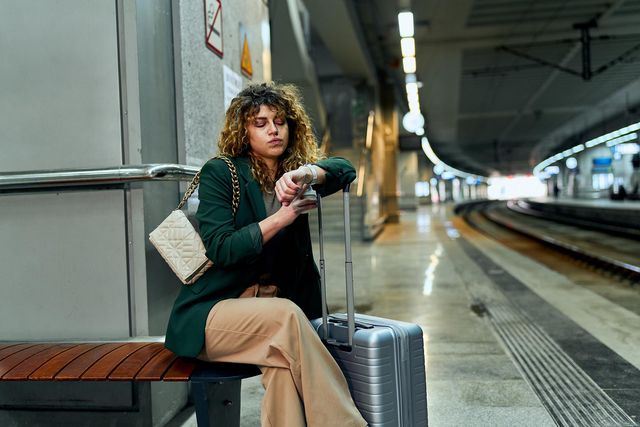05 June 2025
On average, we spend a good year of our lives waiting: at supermarket checkouts and traffic lights, at the doctor’s, at government agencies. For many, this imposed downtime is torture; for some people, so much so that they would rather spend money to buy their way out of queuing. Entire business models such as “priority boarding” at the airport or the “fast lane passes” found in amusement parks are sustained by this aversion to waiting. But why are we wait so reluctant to wait, and what makes waiting particularly difficult on some occasions and easier on others?
Every minute spent in supermarket checkout queue represents a loss of control: We have to wait to finally get our turn – but have no influence over when it will happen. This feeling of powerlessness is repugnant to our all-too-human need for self-efficacy, said sociologist Rainer Paris, who has made scientific studies of waiting, to German broadcaster MDR.
This would seem to be proven by the fact that, for people who wait voluntarily, time seems to pass faster. This was shown by an experiment in California. A selection of students who wanted to get to university by bus and train were given two alternatives: Pay 75 cents and set off immediately or wait five minutes and travel for free. And what do you know: To all those who had decided to wait, it was as if those five minutes passed quicker than they did for those other passengers who stood at the stop for just as long but without having any choice in the matter.
Whether and when we get frustrated by waiting – and whether we do in the first place – has “a lot to do with our culture,” says Katrin Müller from the Medical-Psychological Institute of TÜV NORD in Düsseldorf. Some cultures understand time as a cyclical phenomenon without a beginning or an end. “In our view of time, however, it passes once and for all and never returns,” explains the psychologist. “That’s why time is a precious commodity for us. It can be invested or saved, wasted or stolen.”
Good waiting, bad waiting
Whether we feel that our precious time is being stolen from us or that we’re investing it well depends on what we’re waiting for. We don’t mind waiting for something that promises pleasure, at least, and we may even do so full of anticipation, whether we’re waiting for Father Christmas, a brand new electronic device or admission to the only European concert being played by our favourite band. If, on the other hand, what awaits us is less pleasurable – having to go to a government office to renew some documents, for instance – or maybe even scary, like a consultation to review test results in an oncology practice, time will appear to pass more slowly. We will feel more tension as our mood darkens.
And we are particularly bad at dealing with uncertain waiting situations. Research has shown that, the harder it is for us to estimate how long something will take, the more stress we feel. To counteract this, the operators of amusement parks put up signs which say things like “30 minutes to go from here”. And they often like to trick us in such circumstances by telling us that we’ll have to wait longer than actually turns out to be the case. If you get your turn earlier than expected, you’ll feel happier and climb aboard the roller coaster in a good mood. In this way, we will tend to remember the positive surprise rather than the time we spent waiting beforehand.
Queues in all official spaces, unite!
The dull feeling you get when you’re standing in the wrong queue offers fertile soil for frustration: The other queue seems to be moving much faster, while the one you’re in isn’t going anywhere. To avoid providing a breeding ground for this nagging discomfort, queues have been bundled together in post offices, at railway station counters and in many banks: Instead of several lines, there is now only one. Once you have reached the front, you head for the next free counter. This prevents queue envy and is demonstrably fairer to boot: Whoever gets there first is guaranteed to be the first to be seen.
It’s all about getting there
To alleviate the agony of waiting, it may be enough to make the end goal of the waiting period less unpleasant. A team led by economist and Nobel laureate Daniel Kahneman first had test subjects dip one hand in cold water with a temperature of 14 degrees for one minute, followed by the other hand for a minute and a half, the difference being that after one minute the water temperature increased to 15 degrees.
When they were given the option to choose which procedure they wanted to repeat, most of them chose the second, even though it took longer. But that apparently seemed to be the lesser of two evils, because the warmer water made the final phase more bearable. To have a positive outcome at the end of a wait is also important because we get more impatient the closer we come to our goal – whether it be the end of those annoying roadworks or the supermarket checkout – as researchers at the University of Texas at Austin have observed in several experiments.
Banishing the waiting blues by playing toe piano
But couldn’t they just make the entire waiting period more pleasant? The Bank of Boston tried to do this more than 30 years ago in a scientifically accompanied field study. Two measures were tested alternately: A screen with messages and a time display with an estimated waiting time. The result? The time display did not reduce stress levels or increase customer satisfaction – presumably because the displayed time drew more attention to the fact of having to wait. The message board, on the other hand, made the waiting time a little more pleasant.
“The key is to distract people’s attention from waiting,” explains Katrin Müller from TÜV NORD. A famous series of studies proved this more than 50 years ago. Psychologist Walter Mischel gave toddlers the choice of either eating a sweet that was put in front of them right away or waiting 15 minutes and getting another one as a reward. Around a third of the children succeeded in resisting temptation for the entire time, and one in four managed to hang on for half of it.
One strategy which particularly helped them was to distract themselves and occupy themselves by other means. Some sang songs to themselves, others took off their shoes and played the piano on their toes. “Children transform the extremely difficult task of waiting into something that is less hard work,” said Mischel about the findings from his studies.
It’s better to wait together than alone
It’s no different for adults, some of whom even prefer to endure pain rather than boredom, as a study at the University of Virginia revealed. Test subjects were asked to sit on a chair in an empty room for 15 minutes. Their only option was to administer electric shocks to themselves at the touch of a button. And in fact, two out of three men and one in four women did exactly that – even though all of them found the electric shock unpleasant during a preliminary test.
The experiment demonstrates how excruciating it can be to just sit and wait for time to pass. However, reaching for a device to administer an electric shock instead is only recommended to a limited extent. And playing the piano on your own toes in public may be a bit uncomfortable for people who are too old to be at nursery school. So, if you find that you’re stuck in a waiting room for hours and there is no exciting reading matter at hand, psychologist Katrin Müller has another piece of advice: Just talk to those waiting with you. Because, as a Chinese study has shown, waiting is easier with others than on your own. And a conversation with a stranger will often turn out to be more enjoyable than expected, says the psychologist. “If you're lucky, you’ll enjoy it so much that you’d rather carry on waiting for a few more minutes at the end.”



